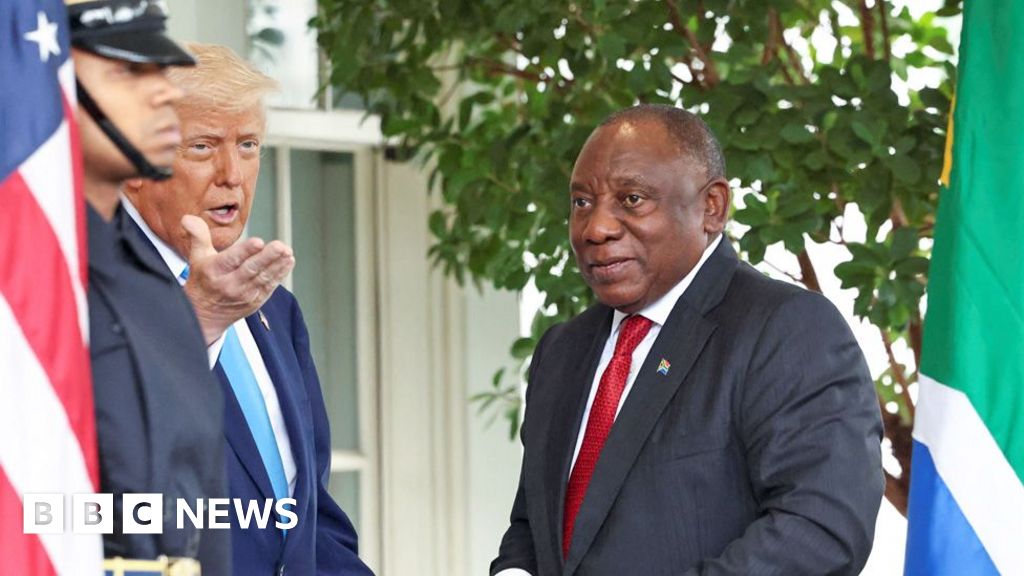South Africa has skated over the latest criticism from US President Donald Trump, who has said he does not think the country should be part of the G20 any longer.
Presidential spokesperson Vincent Magwenya told the BBC his country was confident it would host a very successful G20 summit when leaders from the world’s largest economies gather in Johannesburg later this month.
Trump, who has repeatedly accused South Africa of discriminating against its white minority, will not be attending – sending Vice-President JD Vance instead.
Every year, a different member state holds the presidency of the G20 and sets the agenda for the leaders’ summit – with the US due to take over after South Africa.
«South Africa shouldn’t even be in the Gs any more, because what’s happened there is bad. I’m not going to represent our country there. It shouldn’t be there,» Trump said at a conference in Miami on Wednesday.
South Africa’s government declined to make a full statement in response to these comments, though last week it hit back at the US’s decision to prioritise refugee applications from white South African Afrikaners, who are mostly descendants of Dutch and French settlers.
It said claims of a white genocide had been widely discredited and lacked reliable evidence.
South Africa’s latest crime statistics do not indicate that more white people have fallen victim to violent crime than other racial groups.
The G20 was founded in 1999 after the Asian financial crisis. The nations involved have more than 85% of the world’s wealth and its aim was to restore economic stability.
The first leaders’ summit was held in 2008 in response to that year’s global financial turmoil, to promote international co-operation.
Now the leaders get together each year – along with representatives of the European Union and African Union – to talk about the world’s economies and the issues countries are facing.
There is no formal procedure laid down for kicking a country out of the G20 as it is not a treaty-based organisation like the UN and does not have a legal charter or constitution. It is an informal forum that operates by consensus.
«If a country was going to be kicked out, it would basically mean that it was excluded from the meetings – it wasn’t invited to the meetings by whoever was hosting the G20 that year,» Dr Andrew Gawthorpe from UK-based think-tank the Foreign Policy Centre told the BBC.
«But the host country would be unlikely to take the decision to not invite another country unless there was agreement amongst the rest of the members to do that,» he said.
Chris Vandome, senior research fellow at Chatham House’s Africa programme, agrees such a consensus would be unlikely – and historically the US’s participation in the G20 had been regarded as disruptive.
«A number of the working groups and ministerial meetings have not led to declarations… because the Americans have been disrupting things,» he told the BBC.
In fact he noted that other countries had doubled down and seen the US’s position as an opportunity.
«In particular the European Union, with large financial commitments made to South Africa and Africa,» Mr Vandrome said.
«Also, on the Asian side, there’s no way that I think that China would accept a sort of rejection of South Africa.»
The obvious historical precedent is Russia’s expulsion from what was then the G8 – a grouping of the world’s most advanced economies – after the annexation of Crimea in 2014.
Russia remains in the G20, which includes countries from around the world. There were calls for Russia to be expelled from the G20 after the 2022 full-scale invasion of Ukraine, but in a larger grouping of countries with their own alliances, consensus could not be reached.
This year South Africa has adopted the theme of solidarity, equality and sustainability – something the country’s foreign ministry spokesperson Chrispin Phiri emphasised following Trump’s criticism.
«Drawing on our own journey from racial and ethnic division to democracy, South Africa is uniquely positioned to champion within the G20 a future of genuine solidarity, where shared prosperity bridges deep inequalities,» Mr Phiri said in a statement to the BBC.
«And collective action for sustainability that centres the development to address the impact of colonialism of the African continent.»
Trump offered refugee status to Afrikaners earlier this year after South African President Cyril Ramaphosa signed a law allowing the government to seize land without compensation in rare instances.
Most private farmland is owned by white South Africans, who make up just over 7% of the population.
South Africa made efforts to soothe tensions, with Ramaphosa going to the White House in May with a large delegation that included white members of his coalition government and also famous white South African golfers.
But Trump ambushed the Oval Office meeting with claims that white South African farmers were being killed and «persecuted» – producing unsubstantiated evidence that has been widely discredited.
Further efforts by South Africa to mend the relationship failed, with Africa’s largest economy being hit in August with 30% tariffs on goods being exported to the US – the highest rate in sub-Saharan Africa.
Additional reporting by Stuart Hughes




